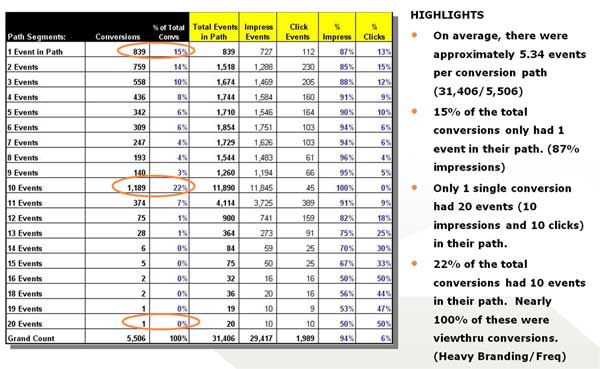This article by Hollis Thomases originally appeared in ClickZ on December 28,2010.
I recently spoke with Jason Heller, EVP of The Laredo Group, a media training and consulting firm, about the topic of my last column, “Different Views of View-Through Tracking.” He asserted that though view-through tracking can be helpful, the real sleeper tool in the online media planning world is attribution reporting. Are you curious to learn why Heller and other attribution experts feel this way? Read on.
What Is Attribution?
Simplified, attribution in the context of online marketing and advertising is how credit is assigned for an action or “conversion.” Attribution experts consistently cite that too many people rely on the last click as the source of a conversion. Instead, planners should consider, measure, and give credit to multiple touches that influence the final outcome. Those touches could be any number of things: numerous display ad impressions; e-mail campaigns; affiliate offers; listings in comparison shopping engines; organic search; or PPC ads.
Attribution reporting can also eliminate the risk of assigning double credit (and possibly double-payment) to more than one tactic or more than one affiliate (“de-duplication”). For example, an e-mail-initiated online shopper who, doing a last-minute search for a coupon code, clicks on a PPC ad offered by an affiliate – which tactic would deserve and get assigned credit (or “partial attribution”)? This is where attribution reporting tools come in.
The Players
The categories of attribution reporting providers include:
- Ad servers (e.g., DoubleClick DFA, Atlas, Media Mind, Mediaplex)
- Advanced Web analytics software (e.g., Coremetrics, Omniture)
- Third-party tools/custom software (e.g., ClearSaleing, Visual, IQ, TagMan, Theorem, Shomei)
Each provide different levels of reporting and analytics, so you’ll want to understand your greatest needs and consider what’s at your disposal already.
Challenges of Attribution Reporting
Heller thinks that one of the challenges in adopting attribution reporting (and subsequent media planning based on true attribution) is that the subject alone is an advanced topic. Heller points to the fact that too few media planners even know about/take advantage of well-known campaign management elements such as frequency capping. In order to embrace attribution-based media planning, the planner has to first move beyond common nomenclature and stop thinking of click-through rates as key performance indicators or last clicks as the primary source of conversions.
Though you might find attribution reporting more commonly used in the direct response space, brand advertisers could benefit equally from this kind of analysis. And though attribution tracking-reporting-analysis has been going on for four or five years now, misconceptions, inconsistencies, and imperfections still abound.
Navigating the Attribution Discussion
In talking to multiple sources about attribution, I could understand why Heller describes this discussion as challenging. There are different descriptions for attribution tracking/reporting, e.g., “Engagement Mapping,” “Path to Conversion,” “Impression Attribution,” “Interactive Attribution,” “Attribution Modeling,” etc.
Chris Brinkworth, CMO of TagMan raised some other common points of confusion:
- What can (or can’t) your tool include and track, e.g., can unpaid traffic drivers like direct-to-site, natural search, in-house e-mail blasts, social media, and mobile be tracked?
- Are you sure the right tactic is getting the proper attribution (and that one tactic isn’t improperly getting credit)…and can you do anything to mitigate that?
- Can your solution track and account for offline tactics that drive online conversions?
- Are there multiple cooks in the kitchen, e.g., multiple agencies executing different tactics whose technologies and reporting don’t give a comprehensive picture?
- Do you risk giving the client too much data such that they get mired in analysis paralysis?
- Is attribution tracking and reporting part of a tool you’re already using and if so, does it cost extra to use and what are its limitations?
The Attribution Process
As several experts point out, the attribution process needs to start by coming up with the key questions you need answered by an attribution model. For example:
- How many times is our advertising interacting with users prior to their response?
- Which channels/sources are influencing response?
- Can we determine if there is a quantitative value of a tactic that aids in conversion but isn’t last click?
After your attribution model is established, you need some time to let all of your activities run and be measured before beginning to analyze your comparative data. Below are some reporting screen shots provided by Mediaplex to help illustrate certain attribution reporting:

This screen shows the top conversion rates and associated number of events (touches) it took to drive those conversions.

In this example, display was involved in 81 percent of the conversions, yet only credited on 61 percent of the conversions won; it also influenced 52 percent of the paid search-credited conversions.
Some final words: everyone I spoke to in the attribution tracking/reporting space at least agrees on one thing – attribution is a nascent field but once more marketers recognize its value, it will definitely grow as an important media planning tool.
Related posts:
- Data Reporting Tools That Aid Media Planning
- Media Planning for eCPA and Other Performance Metrics
- Streaming Media As A Marketing Tool
- Summertime Media Planning Strategies
»
Leave a comment
Web Ad.vantage is a full-service online marketing company with core competencies in search engine optimization, PPC Campaign Management and online media buying. Visit our Internet Marketing Services section to learn more about our full range of services.
WebAdvantage.net encourages the reprinting of our marketing tips and articles. Before doing so, however, please contact us at for permission to do so. The company bio located above is required to accompany any reprint. Thank you in advance for your professional courtesy.
Pragmatic, professional advice with no hidden agenda.

Internet Business Forum






 back to top
back to top






